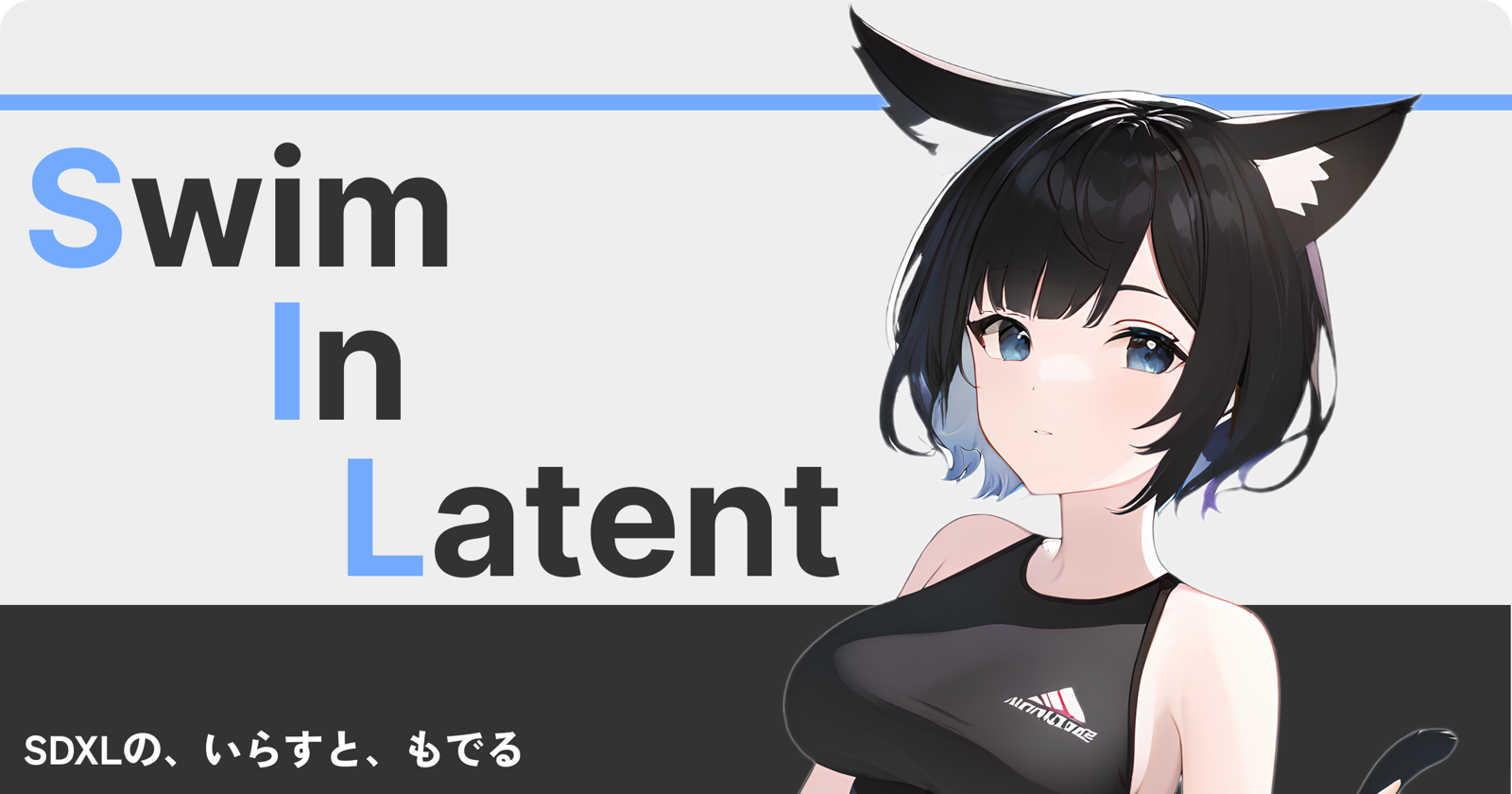Since I am Japanese, I may not be able to use English properly. Please let me know if there are any unnatural sentences.
Swim in Latentとは | What is "Swim in Latent"

https://civitai.com/models/118525/swim-in-latent
先日公開した、StableDiffusionXL1.0ベースのアニメ風モデルです。
良かったら使ってみてください。上のリンクからダウンロードできます。
This is an anime-style model based on StableDiffusionXL1.0 that was released the other day.
Please use it if you like. You can download it from the link above.
制作手順 | How the model was learned
Step 1: データセットを作る | make a dataset
- ベースデータセット | Base dataset
まず初めにdanbooruから数万枚の画像を集めました。
集める画像は4年以内のものにし、なるべくscoreが高い順に、"rating:general"とそれ以外を半々の割合になるように収集しました。
タグ付けにはwd14taggerのswinv2を利用し、頭にはwdxlに習って"new, newest, masterpiece, best quality"を頭に付けました。今考えるとこれは冗長だったのかもしれません。
これをベース用データセットとします。
本当はdanbooruすべてを何周か学習させるべきだと思いますが、自分にはそのような開発環境がないため妥協しました。
First, we collected tens of thousands of images from danbooru.
Images were collected within the last 4 years, and were collected in descending order of score as much as possible, with "rating:general" and others in a 50/50 ratio.
I used wd14tagger's swinv2 for tagging, and added "new, newest, masterpiece, best quality" to the head following wdxl. Now that I think about it, this may have been redundant.
Let this be the base dataset.
Actually, I think I should learn everything about danbooru several times, but I compromised because I don't have such a development environment.
- FT用データセット | Dataset for FT
次に絵柄をある程度統一するためにFT用データセットを作ります。
このデータセットでは、なるべくモダンでリアルな質感の絵柄の絵を500枚ほど集めました。
ちょうどよさそうな絵柄のアーティストを探し、いくつかリストアップしてから集めました。
これも同じようにwd14taggerのswinv2を使用しました。
Next, create a data set for FT to unify the style to some extent.
For this data set, we have collected about 500 pictures with modern and realistic textures as much as possible.
I searched for an artist whose style looked just right, made a list of several, and collected them.
I also used wd14tagger's swinv2 in the same way.
Step2: ベースモデルを学習させる | Train the base model
ベースモデルを学習させます。
使用するツールはkohyaさんのsd-scriptsです。sdxl_train.py を使用します。
以下は特に大事と思われる設定です。
Train the base model.
The tool used is kohya's sd-scripts.
Use sdxl_train.py.
Below are the settings that are most important.
optimizer: Lion
lerning rate: 4e-6
lr_scheduler: cosine_with_restarts
min_snr_gamma: 5
caption_dropout_rate: 0.1
mixed_precision: bfloat16
shuffle_caption: trueStep3: ベースモデルをファインチューンする | Finetune the base model
次に先ほど作ったベースモデルをファインチューンします。
ベースモデルと全く同じ設定でデータセットだけ変えて学習します。
Next, fine-tune the base model you made earlier.
It learns by changing only the dataset with exactly the same settings as the base model.
Step:4 さらにファインチューンする | Fine tune further
最後にFT用のデータセットをさらに選別して100枚ほどにし、Loraを学習させます。
以下は設定です。
Finally, the dataset for FT is further screened to about 100 images, and Lora is trained.
Below are the settings.
optimizer: Lion
lerning rate: 5e-5
lr_scheduler: cosine_with_restarts
min_snr_gamma: 5
caption_dropout_rate: 0.1
mixed_precision: bfloat16
shuffle_caption: true
Loraが学習できたら、何度か生成してちょうどいい割合を探します。
そしたら、 sdxl_merge_lora.py を使用してモデルにloraをマージします。
これで完成です。
Once Lora is trained, generate it several times to find the right ratio.
Then merge lora into the model using sdxl_merge_lora.py.
That's all there is to it.
おまけ | Extra
先日StabilityAIから公式のモデルメタデータの形式が発表されました。
今後モデルを作成する場合はこのメタデータをモデルに埋め込むことが望ましいです。
今回リリースしたモデルには以下のようなメタデータが埋め込まれています。
StabilityAI recently announced an official model metadata format.
It is desirable to embed this metadata in the model when creating a model in the future.
The following metadata is embedded in the released model.
https://github.com/Stability-AI/ModelSpec
{
"modelspec.sai_model_spec": "1.0.0.alpha",
"modelspec.architecture": "stable-diffusion-xl-v1-base",
"modelspec.implementation": "sgm",
"modelspec.title": "SwimInLatent",
"modelspec.author": "ddPn08",
"modelspec.description": "StableDiffusionXL model fine-tuned for anime.",
"modelspec.date": "2023-07-29",
"modelspec.license": "CreativeML Open RAIL++-M"
}